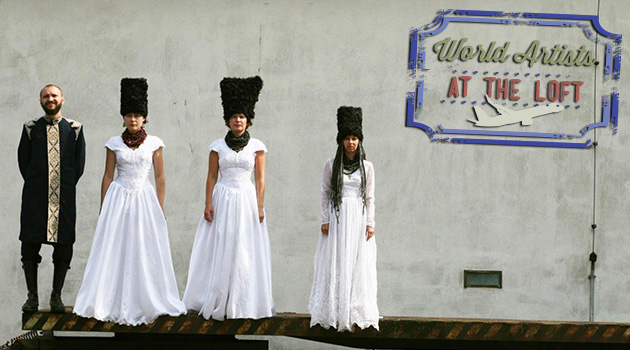Passport to Portsmouth: World Music at the Loft

How has the increased popularity of world music affected how you program the Loft?
World music is seeping into much of the sound we are hearing today from the best young artists, and we’re thrilled to be welcoming many to the Loft this season. A trend we see is an ever-increasing blending of cultural traditions with modern instruments, sounds, and beats.
For example, Mokoomba, from Victoria Falls, Zimbabwe, has a sound that is modern, but also draws heavily on traditional songs and Tonga rhythms as well as Congolese rumba, soukous, funk, pop, country, and the Beatles. Ukrainian folk quartet DakhaBrakha’s sound is a tapestry of drum beats, hypnotic harmonies, didgeridoo, accordion, cello, flute, animal noises, and bird song. They have drawn inspiration from the music of Philip Glass and from some of the oldest folk traditions in Europe.
Fans of Bebel Gilberto and Chico Buarque will love Brazilian composer/singer and multi-instrumentalist Rodrigo Amarante. Singing in Portuguese, his music has been described as “sonically rich and spare at the same time.” Tunisian singer Emel Mathlouthi, who recently performed as part of the Nobel Peace Prize Concert in Norway, infuses unexpected electronic beats with chords and vocals you would expect to hear from Northern Africa for a sound that is hypnotic and beautiful. Flamenco guitarist Juanito Pascual is known in both Spain and the U.S. for his masterful merging of jazz, soul, and rock influences with flamenco.
Why does world music resonate with you?
I’ve been fortunate to explore music from cultures around the world and close to home. Whether I am walking through the streets of New Orleans listening to a brass band, or in Mexico City listening to mariachi, the music has a way of transcending language.
Last spring at SxSW, I was thrilled to see international artists performing on some of the bigger stages. Like, a relatively unknown Belgian singer, Stromae, who performed a set entirely in French to a crowd of thousands.
What world music trends do you see on the horizon?
When I am curating playlists for a weekly radio show I co-host on WUNH, I am astounded by the number of artists breaking onto the college music circuit from around the world. Some of the best new artists are from such places as New Zealand, Australia, Denmark, France, the U.K., and all parts of Africa. And conversely, we see American artists traveling to other countries to study indigenous music. One example is Bela Fleck going to Africa to study the Ngoni, a Malian instrument that is said to have inspired the creation of the banjo.
I see a new world opening up that blends the traditional with the modern, the east with the west, and the analog with the digital to create music withouth national boundaries but with an authentic sense of place.
